Hospitality Provision, Travel & Tourism Sector Analysis Report
VerifiedAdded on 2023/02/02
|10
|3456
|41
Report
AI Summary
This report examines the hospitality industry, focusing on the interrelationship between hospitality, travel, and tourism businesses, using TUI and IHG as case studies. It analyzes the implications of integration, including horizontal and vertical strategies, and their effects on cost, technology, globalization, and economies of scale. The report also explores the rationale for project decisions linked to the target market, and outlines plans for operational and human resource allocation within the hospitality sector. The analysis covers the impact of integration on businesses, considering factors like cost, technology, globalization, lack of knowledge, economies of scale, and quality, providing a comprehensive overview of the challenges and opportunities in the evolving hospitality landscape.
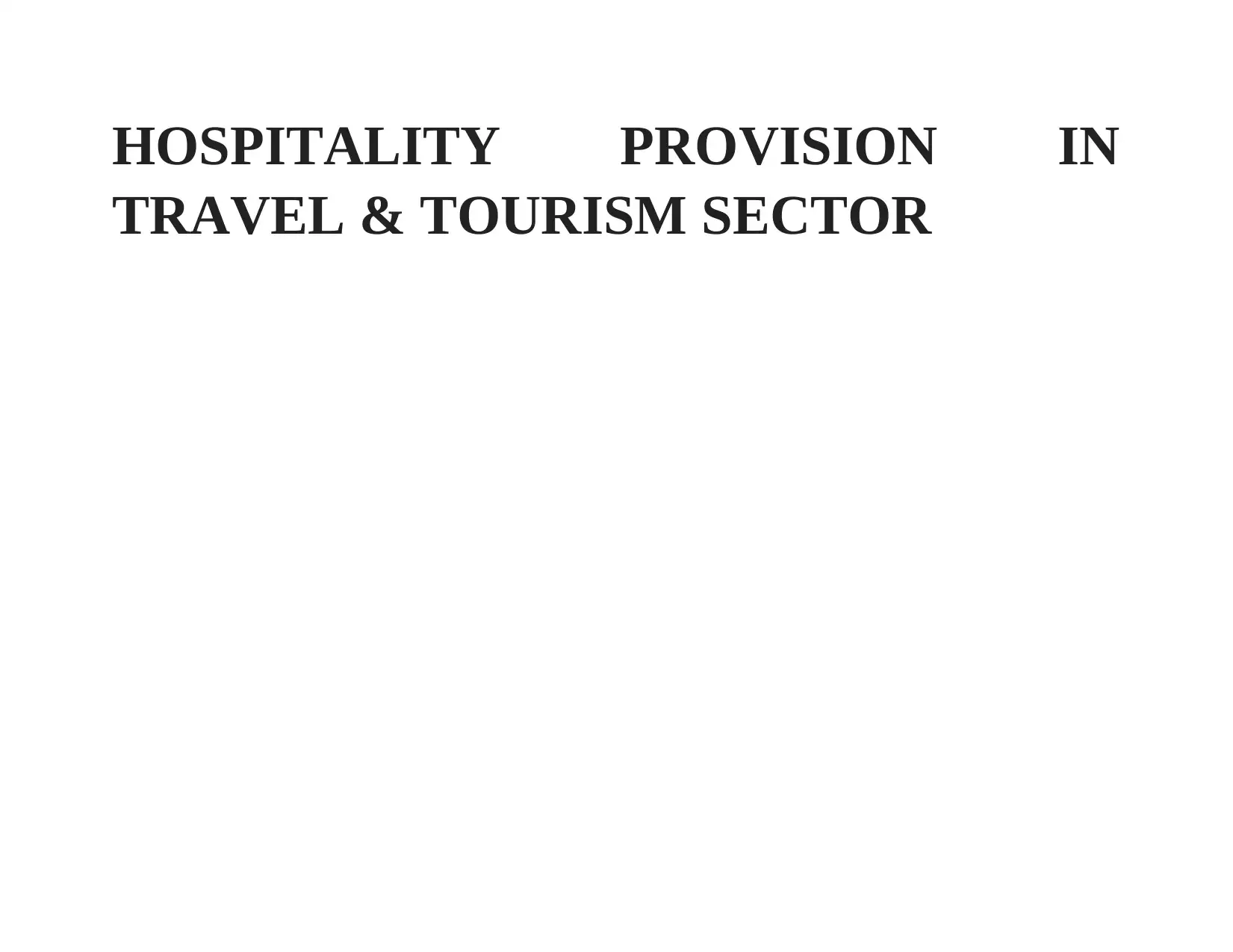
HOSPITALITY PROVISION IN
TRAVEL & TOURISM SECTOR
TRAVEL & TOURISM SECTOR
Paraphrase This Document
Need a fresh take? Get an instant paraphrase of this document with our AI Paraphraser
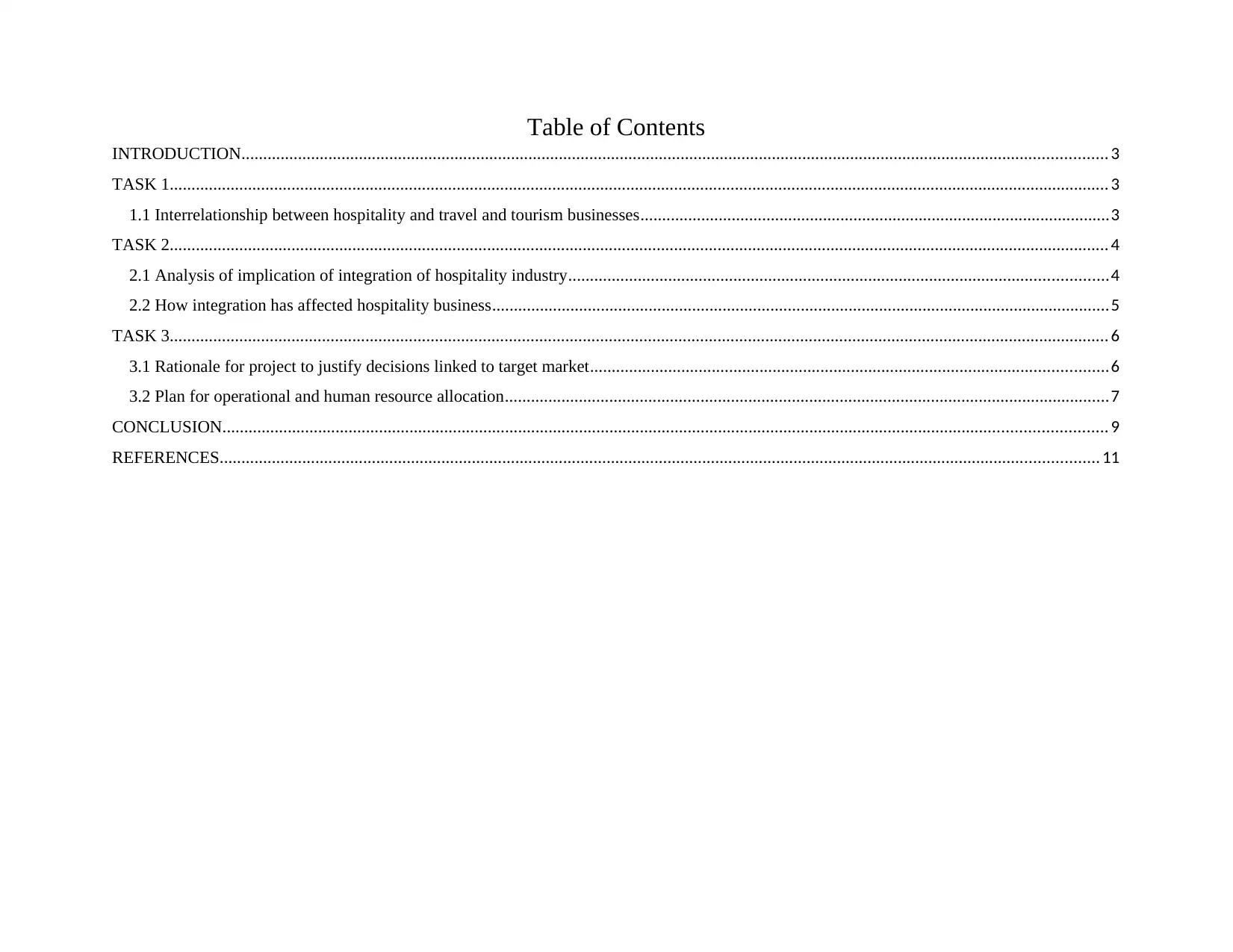
Table of Contents
INTRODUCTION....................................................................................................................................................................................................... 3
TASK 1........................................................................................................................................................................................................................ 3
1.1 Interrelationship between hospitality and travel and tourism businesses............................................................................................................3
TASK 2........................................................................................................................................................................................................................ 4
2.1 Analysis of implication of integration of hospitality industry............................................................................................................................4
2.2 How integration has affected hospitality business..............................................................................................................................................5
TASK 3........................................................................................................................................................................................................................ 6
3.1 Rationale for project to justify decisions linked to target market.......................................................................................................................6
3.2 Plan for operational and human resource allocation...........................................................................................................................................7
CONCLUSION........................................................................................................................................................................................................... 9
REFERENCES.......................................................................................................................................................................................................... 11
INTRODUCTION....................................................................................................................................................................................................... 3
TASK 1........................................................................................................................................................................................................................ 3
1.1 Interrelationship between hospitality and travel and tourism businesses............................................................................................................3
TASK 2........................................................................................................................................................................................................................ 4
2.1 Analysis of implication of integration of hospitality industry............................................................................................................................4
2.2 How integration has affected hospitality business..............................................................................................................................................5
TASK 3........................................................................................................................................................................................................................ 6
3.1 Rationale for project to justify decisions linked to target market.......................................................................................................................6
3.2 Plan for operational and human resource allocation...........................................................................................................................................7
CONCLUSION........................................................................................................................................................................................................... 9
REFERENCES.......................................................................................................................................................................................................... 11
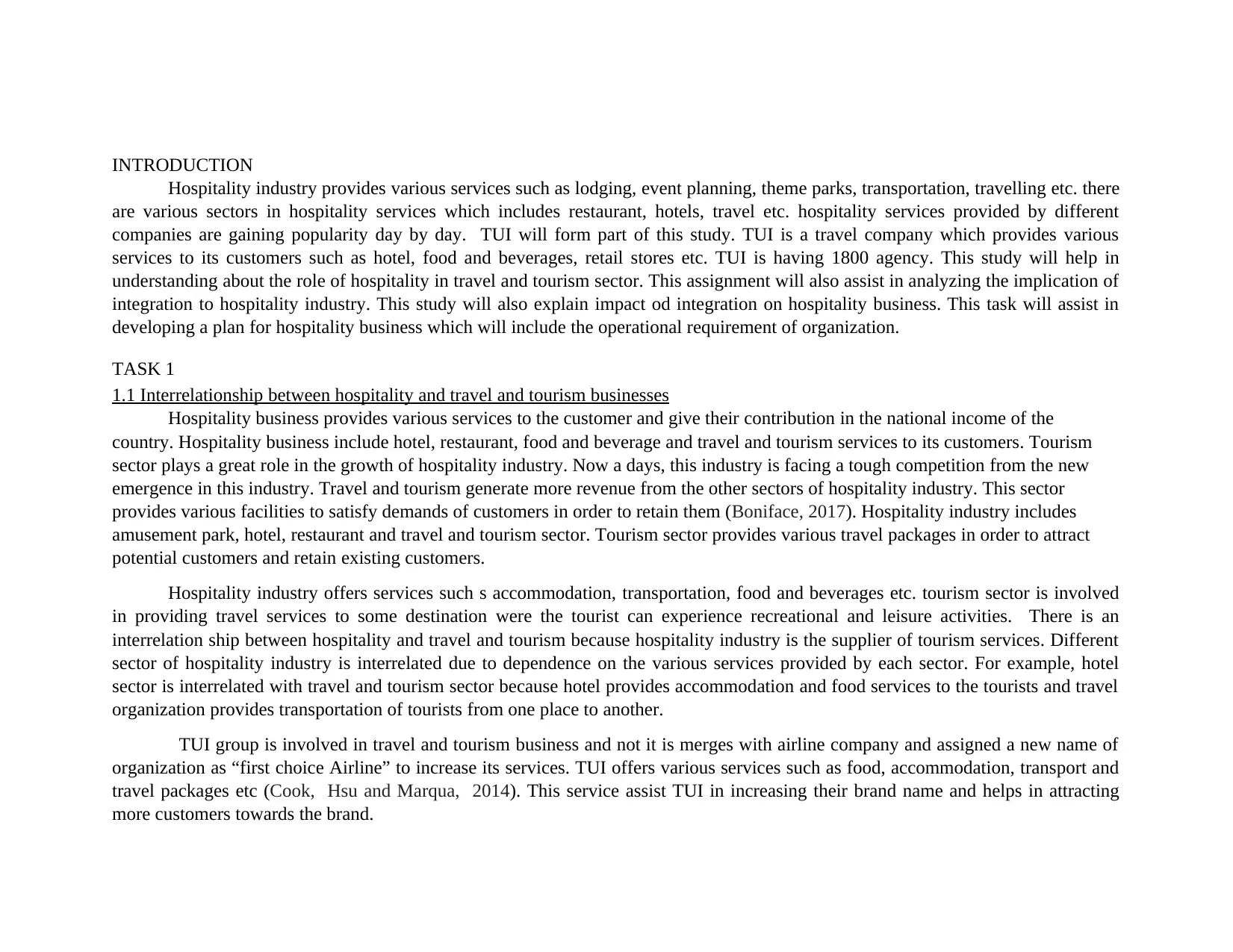
INTRODUCTION
Hospitality industry provides various services such as lodging, event planning, theme parks, transportation, travelling etc. there
are various sectors in hospitality services which includes restaurant, hotels, travel etc. hospitality services provided by different
companies are gaining popularity day by day. TUI will form part of this study. TUI is a travel company which provides various
services to its customers such as hotel, food and beverages, retail stores etc. TUI is having 1800 agency. This study will help in
understanding about the role of hospitality in travel and tourism sector. This assignment will also assist in analyzing the implication of
integration to hospitality industry. This study will also explain impact od integration on hospitality business. This task will assist in
developing a plan for hospitality business which will include the operational requirement of organization.
TASK 1
1.1 Interrelationship between hospitality and travel and tourism businesses
Hospitality business provides various services to the customer and give their contribution in the national income of the
country. Hospitality business include hotel, restaurant, food and beverage and travel and tourism services to its customers. Tourism
sector plays a great role in the growth of hospitality industry. Now a days, this industry is facing a tough competition from the new
emergence in this industry. Travel and tourism generate more revenue from the other sectors of hospitality industry. This sector
provides various facilities to satisfy demands of customers in order to retain them (Boniface, 2017). Hospitality industry includes
amusement park, hotel, restaurant and travel and tourism sector. Tourism sector provides various travel packages in order to attract
potential customers and retain existing customers.
Hospitality industry offers services such s accommodation, transportation, food and beverages etc. tourism sector is involved
in providing travel services to some destination were the tourist can experience recreational and leisure activities. There is an
interrelation ship between hospitality and travel and tourism because hospitality industry is the supplier of tourism services. Different
sector of hospitality industry is interrelated due to dependence on the various services provided by each sector. For example, hotel
sector is interrelated with travel and tourism sector because hotel provides accommodation and food services to the tourists and travel
organization provides transportation of tourists from one place to another.
TUI group is involved in travel and tourism business and not it is merges with airline company and assigned a new name of
organization as “first choice Airline” to increase its services. TUI offers various services such as food, accommodation, transport and
travel packages etc (Cook, Hsu and Marqua, 2014). This service assist TUI in increasing their brand name and helps in attracting
more customers towards the brand.
Hospitality industry provides various services such as lodging, event planning, theme parks, transportation, travelling etc. there
are various sectors in hospitality services which includes restaurant, hotels, travel etc. hospitality services provided by different
companies are gaining popularity day by day. TUI will form part of this study. TUI is a travel company which provides various
services to its customers such as hotel, food and beverages, retail stores etc. TUI is having 1800 agency. This study will help in
understanding about the role of hospitality in travel and tourism sector. This assignment will also assist in analyzing the implication of
integration to hospitality industry. This study will also explain impact od integration on hospitality business. This task will assist in
developing a plan for hospitality business which will include the operational requirement of organization.
TASK 1
1.1 Interrelationship between hospitality and travel and tourism businesses
Hospitality business provides various services to the customer and give their contribution in the national income of the
country. Hospitality business include hotel, restaurant, food and beverage and travel and tourism services to its customers. Tourism
sector plays a great role in the growth of hospitality industry. Now a days, this industry is facing a tough competition from the new
emergence in this industry. Travel and tourism generate more revenue from the other sectors of hospitality industry. This sector
provides various facilities to satisfy demands of customers in order to retain them (Boniface, 2017). Hospitality industry includes
amusement park, hotel, restaurant and travel and tourism sector. Tourism sector provides various travel packages in order to attract
potential customers and retain existing customers.
Hospitality industry offers services such s accommodation, transportation, food and beverages etc. tourism sector is involved
in providing travel services to some destination were the tourist can experience recreational and leisure activities. There is an
interrelation ship between hospitality and travel and tourism because hospitality industry is the supplier of tourism services. Different
sector of hospitality industry is interrelated due to dependence on the various services provided by each sector. For example, hotel
sector is interrelated with travel and tourism sector because hotel provides accommodation and food services to the tourists and travel
organization provides transportation of tourists from one place to another.
TUI group is involved in travel and tourism business and not it is merges with airline company and assigned a new name of
organization as “first choice Airline” to increase its services. TUI offers various services such as food, accommodation, transport and
travel packages etc (Cook, Hsu and Marqua, 2014). This service assist TUI in increasing their brand name and helps in attracting
more customers towards the brand.
⊘ This is a preview!⊘
Do you want full access?
Subscribe today to unlock all pages.

Trusted by 1+ million students worldwide
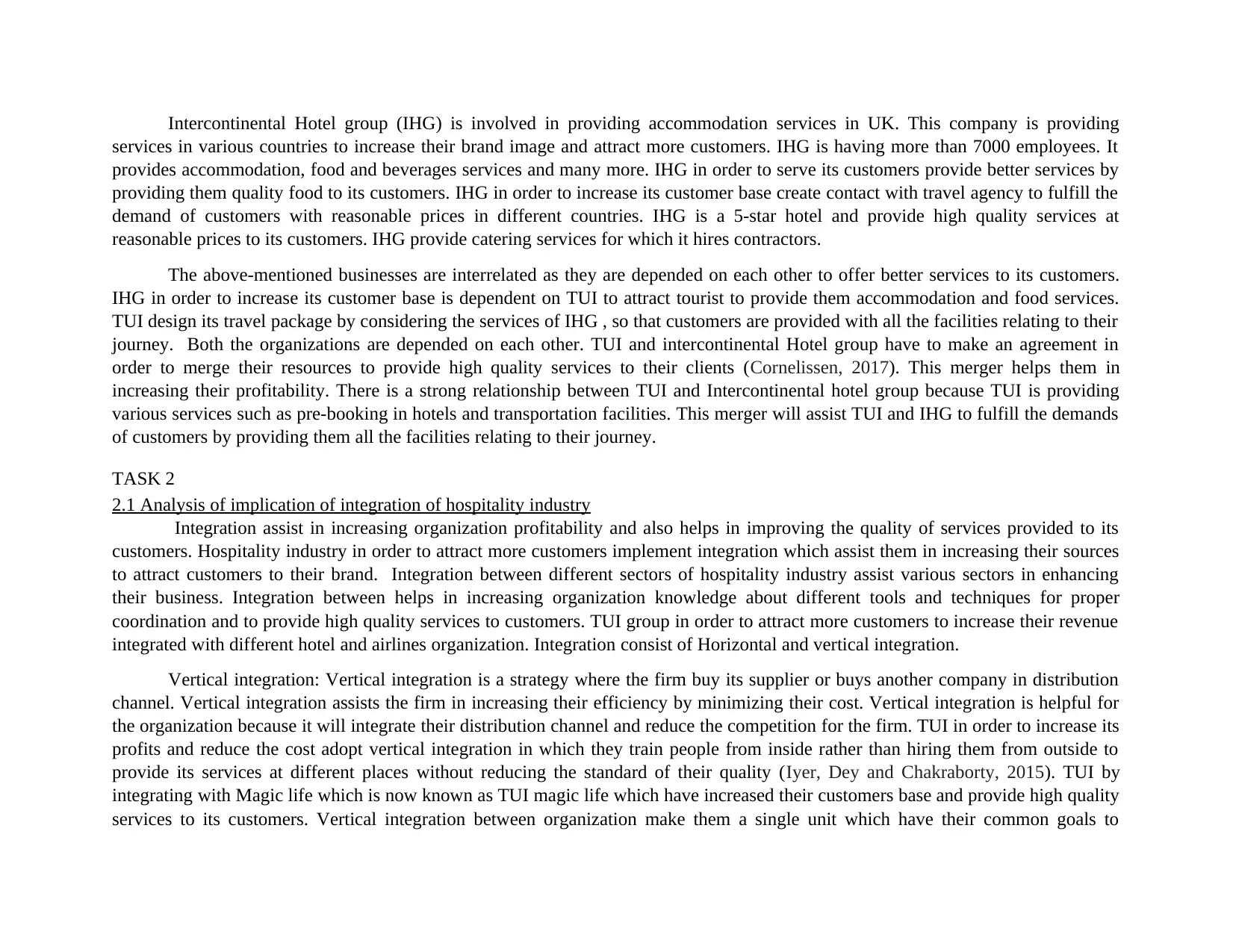
Intercontinental Hotel group (IHG) is involved in providing accommodation services in UK. This company is providing
services in various countries to increase their brand image and attract more customers. IHG is having more than 7000 employees. It
provides accommodation, food and beverages services and many more. IHG in order to serve its customers provide better services by
providing them quality food to its customers. IHG in order to increase its customer base create contact with travel agency to fulfill the
demand of customers with reasonable prices in different countries. IHG is a 5-star hotel and provide high quality services at
reasonable prices to its customers. IHG provide catering services for which it hires contractors.
The above-mentioned businesses are interrelated as they are depended on each other to offer better services to its customers.
IHG in order to increase its customer base is dependent on TUI to attract tourist to provide them accommodation and food services.
TUI design its travel package by considering the services of IHG , so that customers are provided with all the facilities relating to their
journey. Both the organizations are depended on each other. TUI and intercontinental Hotel group have to make an agreement in
order to merge their resources to provide high quality services to their clients (Cornelissen, 2017). This merger helps them in
increasing their profitability. There is a strong relationship between TUI and Intercontinental hotel group because TUI is providing
various services such as pre-booking in hotels and transportation facilities. This merger will assist TUI and IHG to fulfill the demands
of customers by providing them all the facilities relating to their journey.
TASK 2
2.1 Analysis of implication of integration of hospitality industry
Integration assist in increasing organization profitability and also helps in improving the quality of services provided to its
customers. Hospitality industry in order to attract more customers implement integration which assist them in increasing their sources
to attract customers to their brand. Integration between different sectors of hospitality industry assist various sectors in enhancing
their business. Integration between helps in increasing organization knowledge about different tools and techniques for proper
coordination and to provide high quality services to customers. TUI group in order to attract more customers to increase their revenue
integrated with different hotel and airlines organization. Integration consist of Horizontal and vertical integration.
Vertical integration: Vertical integration is a strategy where the firm buy its supplier or buys another company in distribution
channel. Vertical integration assists the firm in increasing their efficiency by minimizing their cost. Vertical integration is helpful for
the organization because it will integrate their distribution channel and reduce the competition for the firm. TUI in order to increase its
profits and reduce the cost adopt vertical integration in which they train people from inside rather than hiring them from outside to
provide its services at different places without reducing the standard of their quality (Iyer, Dey and Chakraborty, 2015). TUI by
integrating with Magic life which is now known as TUI magic life which have increased their customers base and provide high quality
services to its customers. Vertical integration between organization make them a single unit which have their common goals to
services in various countries to increase their brand image and attract more customers. IHG is having more than 7000 employees. It
provides accommodation, food and beverages services and many more. IHG in order to serve its customers provide better services by
providing them quality food to its customers. IHG in order to increase its customer base create contact with travel agency to fulfill the
demand of customers with reasonable prices in different countries. IHG is a 5-star hotel and provide high quality services at
reasonable prices to its customers. IHG provide catering services for which it hires contractors.
The above-mentioned businesses are interrelated as they are depended on each other to offer better services to its customers.
IHG in order to increase its customer base is dependent on TUI to attract tourist to provide them accommodation and food services.
TUI design its travel package by considering the services of IHG , so that customers are provided with all the facilities relating to their
journey. Both the organizations are depended on each other. TUI and intercontinental Hotel group have to make an agreement in
order to merge their resources to provide high quality services to their clients (Cornelissen, 2017). This merger helps them in
increasing their profitability. There is a strong relationship between TUI and Intercontinental hotel group because TUI is providing
various services such as pre-booking in hotels and transportation facilities. This merger will assist TUI and IHG to fulfill the demands
of customers by providing them all the facilities relating to their journey.
TASK 2
2.1 Analysis of implication of integration of hospitality industry
Integration assist in increasing organization profitability and also helps in improving the quality of services provided to its
customers. Hospitality industry in order to attract more customers implement integration which assist them in increasing their sources
to attract customers to their brand. Integration between different sectors of hospitality industry assist various sectors in enhancing
their business. Integration between helps in increasing organization knowledge about different tools and techniques for proper
coordination and to provide high quality services to customers. TUI group in order to attract more customers to increase their revenue
integrated with different hotel and airlines organization. Integration consist of Horizontal and vertical integration.
Vertical integration: Vertical integration is a strategy where the firm buy its supplier or buys another company in distribution
channel. Vertical integration assists the firm in increasing their efficiency by minimizing their cost. Vertical integration is helpful for
the organization because it will integrate their distribution channel and reduce the competition for the firm. TUI in order to increase its
profits and reduce the cost adopt vertical integration in which they train people from inside rather than hiring them from outside to
provide its services at different places without reducing the standard of their quality (Iyer, Dey and Chakraborty, 2015). TUI by
integrating with Magic life which is now known as TUI magic life which have increased their customers base and provide high quality
services to its customers. Vertical integration between organization make them a single unit which have their common goals to
Paraphrase This Document
Need a fresh take? Get an instant paraphrase of this document with our AI Paraphraser
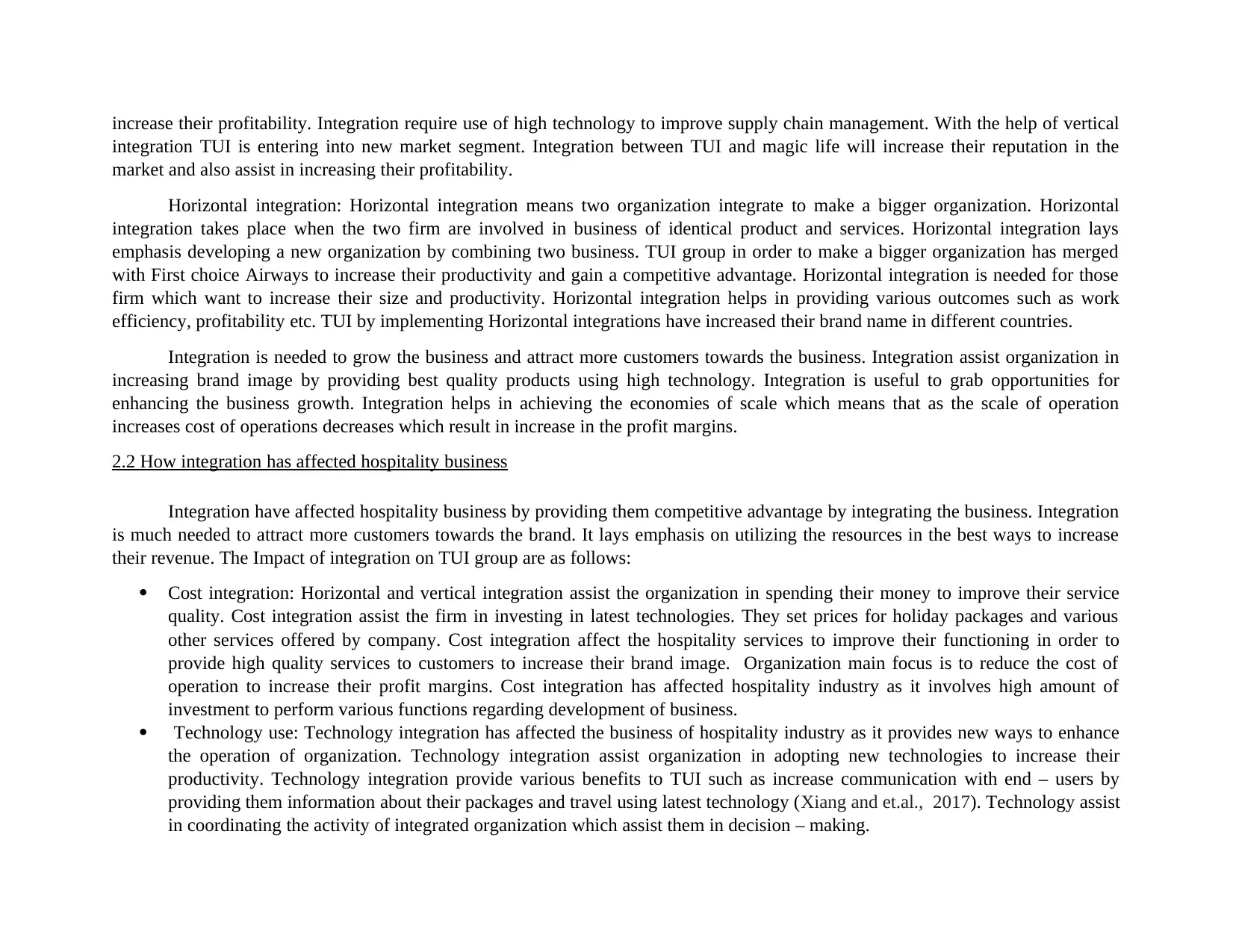
increase their profitability. Integration require use of high technology to improve supply chain management. With the help of vertical
integration TUI is entering into new market segment. Integration between TUI and magic life will increase their reputation in the
market and also assist in increasing their profitability.
Horizontal integration: Horizontal integration means two organization integrate to make a bigger organization. Horizontal
integration takes place when the two firm are involved in business of identical product and services. Horizontal integration lays
emphasis developing a new organization by combining two business. TUI group in order to make a bigger organization has merged
with First choice Airways to increase their productivity and gain a competitive advantage. Horizontal integration is needed for those
firm which want to increase their size and productivity. Horizontal integration helps in providing various outcomes such as work
efficiency, profitability etc. TUI by implementing Horizontal integrations have increased their brand name in different countries.
Integration is needed to grow the business and attract more customers towards the business. Integration assist organization in
increasing brand image by providing best quality products using high technology. Integration is useful to grab opportunities for
enhancing the business growth. Integration helps in achieving the economies of scale which means that as the scale of operation
increases cost of operations decreases which result in increase in the profit margins.
2.2 How integration has affected hospitality business
Integration have affected hospitality business by providing them competitive advantage by integrating the business. Integration
is much needed to attract more customers towards the brand. It lays emphasis on utilizing the resources in the best ways to increase
their revenue. The Impact of integration on TUI group are as follows:
Cost integration: Horizontal and vertical integration assist the organization in spending their money to improve their service
quality. Cost integration assist the firm in investing in latest technologies. They set prices for holiday packages and various
other services offered by company. Cost integration affect the hospitality services to improve their functioning in order to
provide high quality services to customers to increase their brand image. Organization main focus is to reduce the cost of
operation to increase their profit margins. Cost integration has affected hospitality industry as it involves high amount of
investment to perform various functions regarding development of business.
Technology use: Technology integration has affected the business of hospitality industry as it provides new ways to enhance
the operation of organization. Technology integration assist organization in adopting new technologies to increase their
productivity. Technology integration provide various benefits to TUI such as increase communication with end – users by
providing them information about their packages and travel using latest technology (Xiang and et.al., 2017). Technology assist
in coordinating the activity of integrated organization which assist them in decision – making.
integration TUI is entering into new market segment. Integration between TUI and magic life will increase their reputation in the
market and also assist in increasing their profitability.
Horizontal integration: Horizontal integration means two organization integrate to make a bigger organization. Horizontal
integration takes place when the two firm are involved in business of identical product and services. Horizontal integration lays
emphasis developing a new organization by combining two business. TUI group in order to make a bigger organization has merged
with First choice Airways to increase their productivity and gain a competitive advantage. Horizontal integration is needed for those
firm which want to increase their size and productivity. Horizontal integration helps in providing various outcomes such as work
efficiency, profitability etc. TUI by implementing Horizontal integrations have increased their brand name in different countries.
Integration is needed to grow the business and attract more customers towards the business. Integration assist organization in
increasing brand image by providing best quality products using high technology. Integration is useful to grab opportunities for
enhancing the business growth. Integration helps in achieving the economies of scale which means that as the scale of operation
increases cost of operations decreases which result in increase in the profit margins.
2.2 How integration has affected hospitality business
Integration have affected hospitality business by providing them competitive advantage by integrating the business. Integration
is much needed to attract more customers towards the brand. It lays emphasis on utilizing the resources in the best ways to increase
their revenue. The Impact of integration on TUI group are as follows:
Cost integration: Horizontal and vertical integration assist the organization in spending their money to improve their service
quality. Cost integration assist the firm in investing in latest technologies. They set prices for holiday packages and various
other services offered by company. Cost integration affect the hospitality services to improve their functioning in order to
provide high quality services to customers to increase their brand image. Organization main focus is to reduce the cost of
operation to increase their profit margins. Cost integration has affected hospitality industry as it involves high amount of
investment to perform various functions regarding development of business.
Technology use: Technology integration has affected the business of hospitality industry as it provides new ways to enhance
the operation of organization. Technology integration assist organization in adopting new technologies to increase their
productivity. Technology integration provide various benefits to TUI such as increase communication with end – users by
providing them information about their packages and travel using latest technology (Xiang and et.al., 2017). Technology assist
in coordinating the activity of integrated organization which assist them in decision – making.
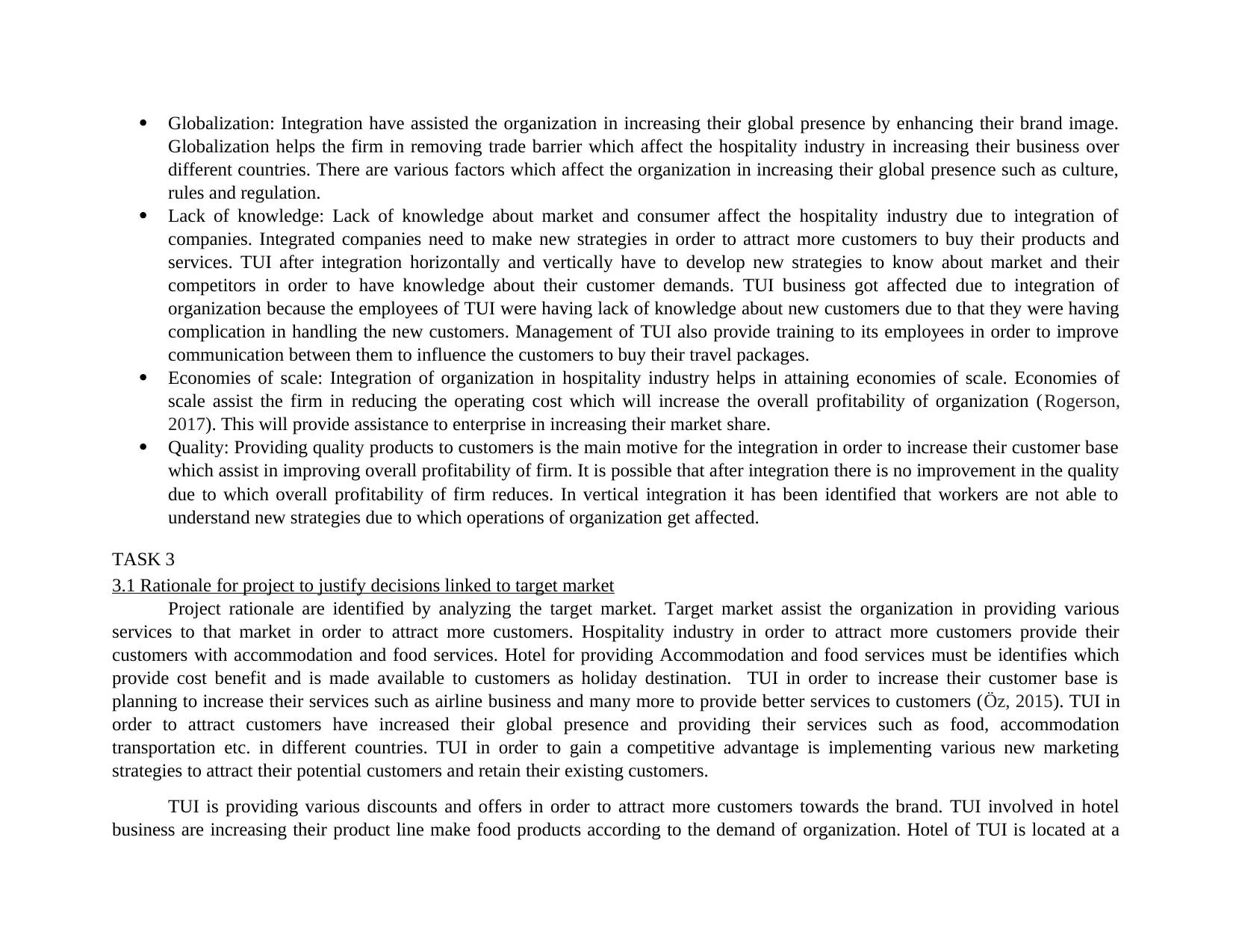
Globalization: Integration have assisted the organization in increasing their global presence by enhancing their brand image.
Globalization helps the firm in removing trade barrier which affect the hospitality industry in increasing their business over
different countries. There are various factors which affect the organization in increasing their global presence such as culture,
rules and regulation.
Lack of knowledge: Lack of knowledge about market and consumer affect the hospitality industry due to integration of
companies. Integrated companies need to make new strategies in order to attract more customers to buy their products and
services. TUI after integration horizontally and vertically have to develop new strategies to know about market and their
competitors in order to have knowledge about their customer demands. TUI business got affected due to integration of
organization because the employees of TUI were having lack of knowledge about new customers due to that they were having
complication in handling the new customers. Management of TUI also provide training to its employees in order to improve
communication between them to influence the customers to buy their travel packages.
Economies of scale: Integration of organization in hospitality industry helps in attaining economies of scale. Economies of
scale assist the firm in reducing the operating cost which will increase the overall profitability of organization (Rogerson,
2017). This will provide assistance to enterprise in increasing their market share.
Quality: Providing quality products to customers is the main motive for the integration in order to increase their customer base
which assist in improving overall profitability of firm. It is possible that after integration there is no improvement in the quality
due to which overall profitability of firm reduces. In vertical integration it has been identified that workers are not able to
understand new strategies due to which operations of organization get affected.
TASK 3
3.1 Rationale for project to justify decisions linked to target market
Project rationale are identified by analyzing the target market. Target market assist the organization in providing various
services to that market in order to attract more customers. Hospitality industry in order to attract more customers provide their
customers with accommodation and food services. Hotel for providing Accommodation and food services must be identifies which
provide cost benefit and is made available to customers as holiday destination. TUI in order to increase their customer base is
planning to increase their services such as airline business and many more to provide better services to customers (Öz, 2015). TUI in
order to attract customers have increased their global presence and providing their services such as food, accommodation
transportation etc. in different countries. TUI in order to gain a competitive advantage is implementing various new marketing
strategies to attract their potential customers and retain their existing customers.
TUI is providing various discounts and offers in order to attract more customers towards the brand. TUI involved in hotel
business are increasing their product line make food products according to the demand of organization. Hotel of TUI is located at a
Globalization helps the firm in removing trade barrier which affect the hospitality industry in increasing their business over
different countries. There are various factors which affect the organization in increasing their global presence such as culture,
rules and regulation.
Lack of knowledge: Lack of knowledge about market and consumer affect the hospitality industry due to integration of
companies. Integrated companies need to make new strategies in order to attract more customers to buy their products and
services. TUI after integration horizontally and vertically have to develop new strategies to know about market and their
competitors in order to have knowledge about their customer demands. TUI business got affected due to integration of
organization because the employees of TUI were having lack of knowledge about new customers due to that they were having
complication in handling the new customers. Management of TUI also provide training to its employees in order to improve
communication between them to influence the customers to buy their travel packages.
Economies of scale: Integration of organization in hospitality industry helps in attaining economies of scale. Economies of
scale assist the firm in reducing the operating cost which will increase the overall profitability of organization (Rogerson,
2017). This will provide assistance to enterprise in increasing their market share.
Quality: Providing quality products to customers is the main motive for the integration in order to increase their customer base
which assist in improving overall profitability of firm. It is possible that after integration there is no improvement in the quality
due to which overall profitability of firm reduces. In vertical integration it has been identified that workers are not able to
understand new strategies due to which operations of organization get affected.
TASK 3
3.1 Rationale for project to justify decisions linked to target market
Project rationale are identified by analyzing the target market. Target market assist the organization in providing various
services to that market in order to attract more customers. Hospitality industry in order to attract more customers provide their
customers with accommodation and food services. Hotel for providing Accommodation and food services must be identifies which
provide cost benefit and is made available to customers as holiday destination. TUI in order to increase their customer base is
planning to increase their services such as airline business and many more to provide better services to customers (Öz, 2015). TUI in
order to attract customers have increased their global presence and providing their services such as food, accommodation
transportation etc. in different countries. TUI in order to gain a competitive advantage is implementing various new marketing
strategies to attract their potential customers and retain their existing customers.
TUI is providing various discounts and offers in order to attract more customers towards the brand. TUI involved in hotel
business are increasing their product line make food products according to the demand of organization. Hotel of TUI is located at a
⊘ This is a preview!⊘
Do you want full access?
Subscribe today to unlock all pages.

Trusted by 1+ million students worldwide
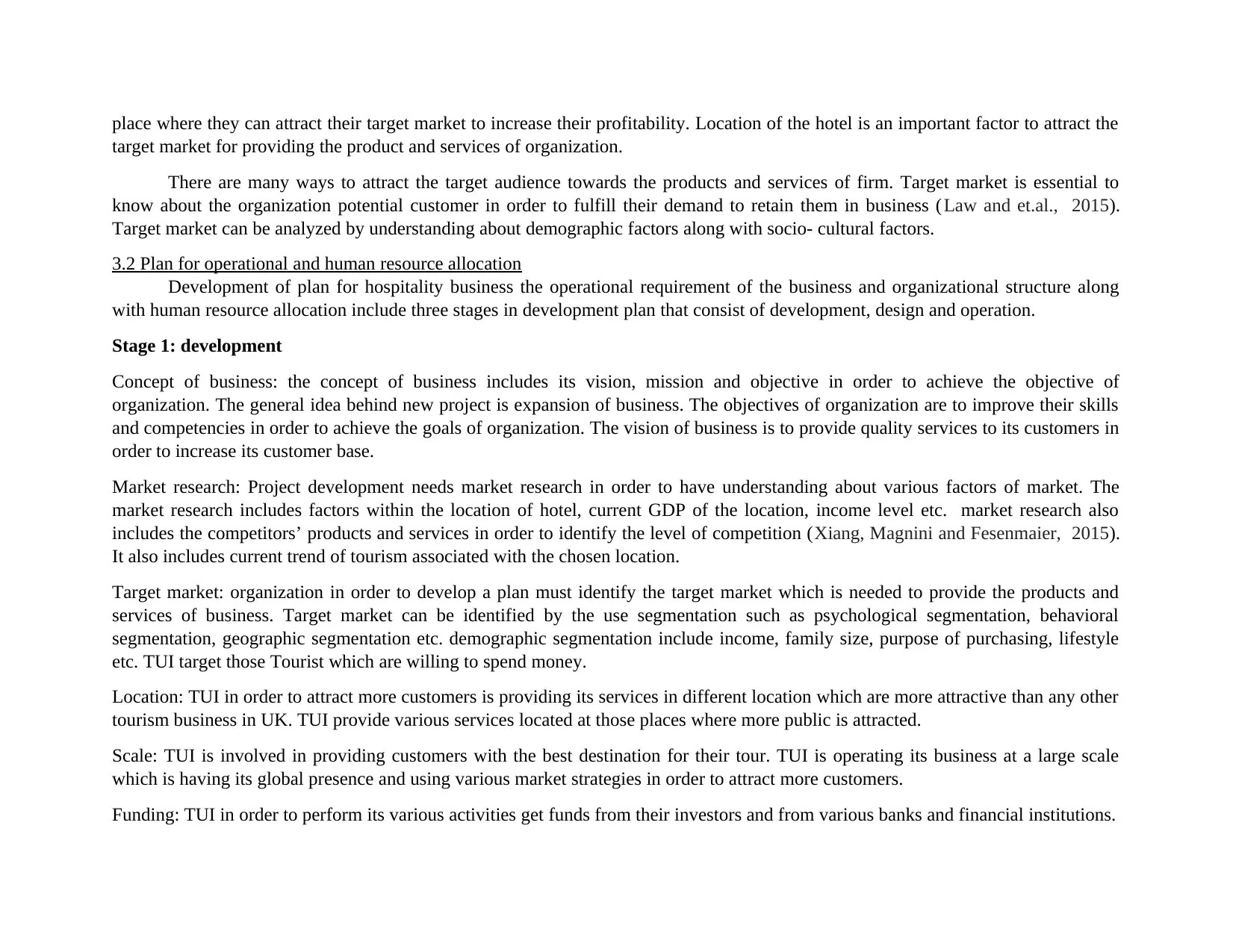
place where they can attract their target market to increase their profitability. Location of the hotel is an important factor to attract the
target market for providing the product and services of organization.
There are many ways to attract the target audience towards the products and services of firm. Target market is essential to
know about the organization potential customer in order to fulfill their demand to retain them in business (Law and et.al., 2015).
Target market can be analyzed by understanding about demographic factors along with socio- cultural factors.
3.2 Plan for operational and human resource allocation
Development of plan for hospitality business the operational requirement of the business and organizational structure along
with human resource allocation include three stages in development plan that consist of development, design and operation.
Stage 1: development
Concept of business: the concept of business includes its vision, mission and objective in order to achieve the objective of
organization. The general idea behind new project is expansion of business. The objectives of organization are to improve their skills
and competencies in order to achieve the goals of organization. The vision of business is to provide quality services to its customers in
order to increase its customer base.
Market research: Project development needs market research in order to have understanding about various factors of market. The
market research includes factors within the location of hotel, current GDP of the location, income level etc. market research also
includes the competitors’ products and services in order to identify the level of competition (Xiang, Magnini and Fesenmaier, 2015).
It also includes current trend of tourism associated with the chosen location.
Target market: organization in order to develop a plan must identify the target market which is needed to provide the products and
services of business. Target market can be identified by the use segmentation such as psychological segmentation, behavioral
segmentation, geographic segmentation etc. demographic segmentation include income, family size, purpose of purchasing, lifestyle
etc. TUI target those Tourist which are willing to spend money.
Location: TUI in order to attract more customers is providing its services in different location which are more attractive than any other
tourism business in UK. TUI provide various services located at those places where more public is attracted.
Scale: TUI is involved in providing customers with the best destination for their tour. TUI is operating its business at a large scale
which is having its global presence and using various market strategies in order to attract more customers.
Funding: TUI in order to perform its various activities get funds from their investors and from various banks and financial institutions.
target market for providing the product and services of organization.
There are many ways to attract the target audience towards the products and services of firm. Target market is essential to
know about the organization potential customer in order to fulfill their demand to retain them in business (Law and et.al., 2015).
Target market can be analyzed by understanding about demographic factors along with socio- cultural factors.
3.2 Plan for operational and human resource allocation
Development of plan for hospitality business the operational requirement of the business and organizational structure along
with human resource allocation include three stages in development plan that consist of development, design and operation.
Stage 1: development
Concept of business: the concept of business includes its vision, mission and objective in order to achieve the objective of
organization. The general idea behind new project is expansion of business. The objectives of organization are to improve their skills
and competencies in order to achieve the goals of organization. The vision of business is to provide quality services to its customers in
order to increase its customer base.
Market research: Project development needs market research in order to have understanding about various factors of market. The
market research includes factors within the location of hotel, current GDP of the location, income level etc. market research also
includes the competitors’ products and services in order to identify the level of competition (Xiang, Magnini and Fesenmaier, 2015).
It also includes current trend of tourism associated with the chosen location.
Target market: organization in order to develop a plan must identify the target market which is needed to provide the products and
services of business. Target market can be identified by the use segmentation such as psychological segmentation, behavioral
segmentation, geographic segmentation etc. demographic segmentation include income, family size, purpose of purchasing, lifestyle
etc. TUI target those Tourist which are willing to spend money.
Location: TUI in order to attract more customers is providing its services in different location which are more attractive than any other
tourism business in UK. TUI provide various services located at those places where more public is attracted.
Scale: TUI is involved in providing customers with the best destination for their tour. TUI is operating its business at a large scale
which is having its global presence and using various market strategies in order to attract more customers.
Funding: TUI in order to perform its various activities get funds from their investors and from various banks and financial institutions.
Paraphrase This Document
Need a fresh take? Get an instant paraphrase of this document with our AI Paraphraser
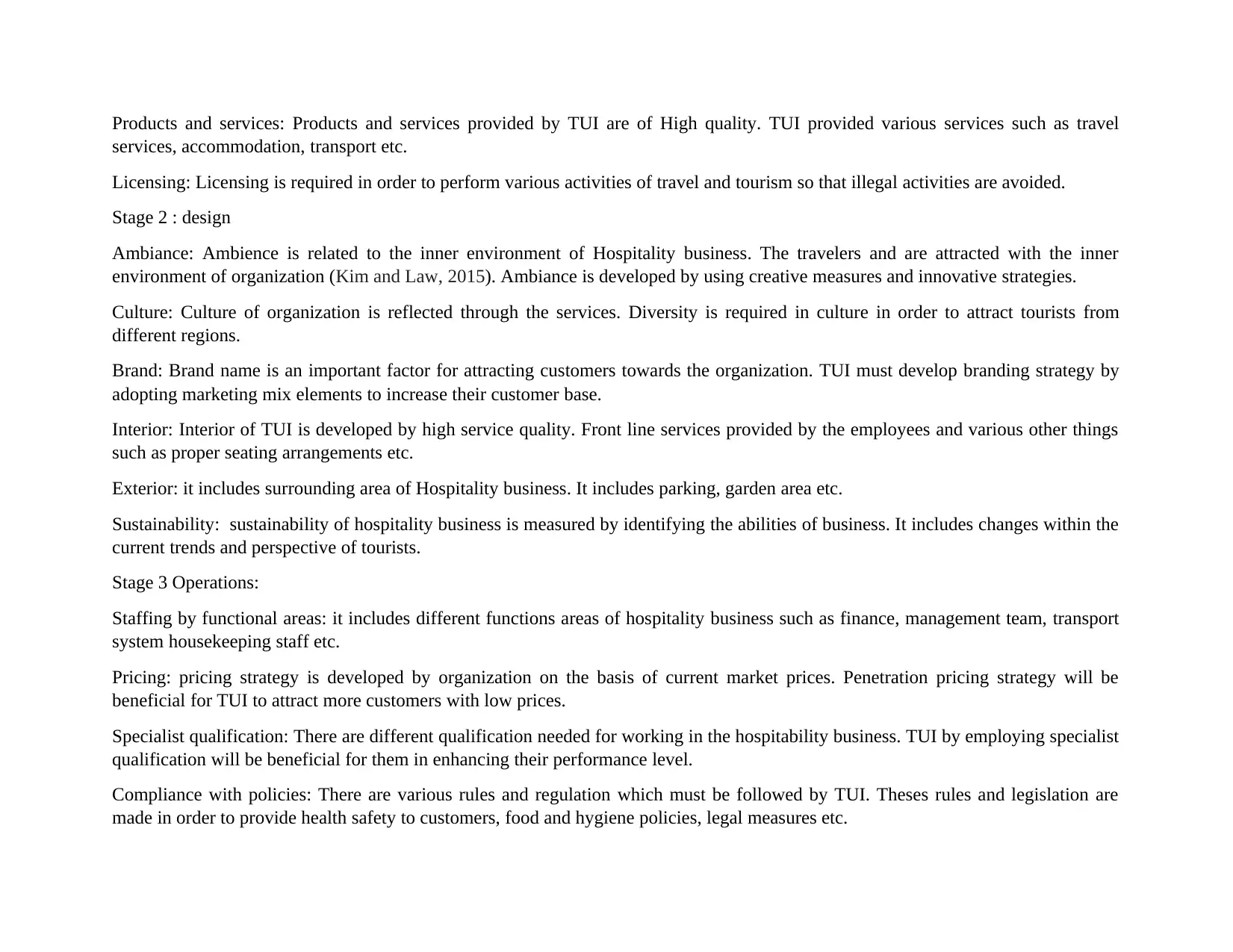
Products and services: Products and services provided by TUI are of High quality. TUI provided various services such as travel
services, accommodation, transport etc.
Licensing: Licensing is required in order to perform various activities of travel and tourism so that illegal activities are avoided.
Stage 2 : design
Ambiance: Ambience is related to the inner environment of Hospitality business. The travelers and are attracted with the inner
environment of organization (Kim and Law, 2015). Ambiance is developed by using creative measures and innovative strategies.
Culture: Culture of organization is reflected through the services. Diversity is required in culture in order to attract tourists from
different regions.
Brand: Brand name is an important factor for attracting customers towards the organization. TUI must develop branding strategy by
adopting marketing mix elements to increase their customer base.
Interior: Interior of TUI is developed by high service quality. Front line services provided by the employees and various other things
such as proper seating arrangements etc.
Exterior: it includes surrounding area of Hospitality business. It includes parking, garden area etc.
Sustainability: sustainability of hospitality business is measured by identifying the abilities of business. It includes changes within the
current trends and perspective of tourists.
Stage 3 Operations:
Staffing by functional areas: it includes different functions areas of hospitality business such as finance, management team, transport
system housekeeping staff etc.
Pricing: pricing strategy is developed by organization on the basis of current market prices. Penetration pricing strategy will be
beneficial for TUI to attract more customers with low prices.
Specialist qualification: There are different qualification needed for working in the hospitability business. TUI by employing specialist
qualification will be beneficial for them in enhancing their performance level.
Compliance with policies: There are various rules and regulation which must be followed by TUI. Theses rules and legislation are
made in order to provide health safety to customers, food and hygiene policies, legal measures etc.
services, accommodation, transport etc.
Licensing: Licensing is required in order to perform various activities of travel and tourism so that illegal activities are avoided.
Stage 2 : design
Ambiance: Ambience is related to the inner environment of Hospitality business. The travelers and are attracted with the inner
environment of organization (Kim and Law, 2015). Ambiance is developed by using creative measures and innovative strategies.
Culture: Culture of organization is reflected through the services. Diversity is required in culture in order to attract tourists from
different regions.
Brand: Brand name is an important factor for attracting customers towards the organization. TUI must develop branding strategy by
adopting marketing mix elements to increase their customer base.
Interior: Interior of TUI is developed by high service quality. Front line services provided by the employees and various other things
such as proper seating arrangements etc.
Exterior: it includes surrounding area of Hospitality business. It includes parking, garden area etc.
Sustainability: sustainability of hospitality business is measured by identifying the abilities of business. It includes changes within the
current trends and perspective of tourists.
Stage 3 Operations:
Staffing by functional areas: it includes different functions areas of hospitality business such as finance, management team, transport
system housekeeping staff etc.
Pricing: pricing strategy is developed by organization on the basis of current market prices. Penetration pricing strategy will be
beneficial for TUI to attract more customers with low prices.
Specialist qualification: There are different qualification needed for working in the hospitability business. TUI by employing specialist
qualification will be beneficial for them in enhancing their performance level.
Compliance with policies: There are various rules and regulation which must be followed by TUI. Theses rules and legislation are
made in order to provide health safety to customers, food and hygiene policies, legal measures etc.
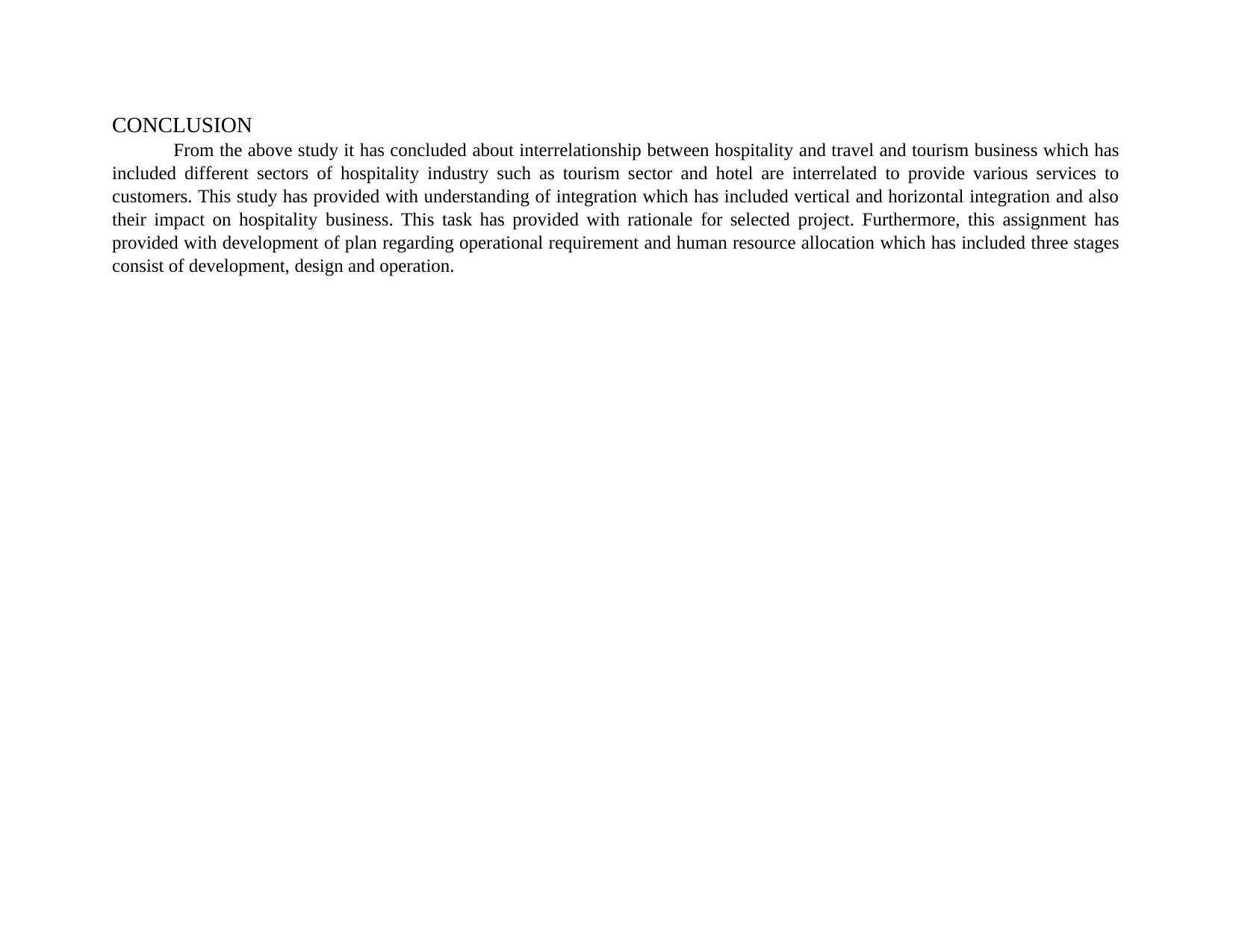
CONCLUSION
From the above study it has concluded about interrelationship between hospitality and travel and tourism business which has
included different sectors of hospitality industry such as tourism sector and hotel are interrelated to provide various services to
customers. This study has provided with understanding of integration which has included vertical and horizontal integration and also
their impact on hospitality business. This task has provided with rationale for selected project. Furthermore, this assignment has
provided with development of plan regarding operational requirement and human resource allocation which has included three stages
consist of development, design and operation.
From the above study it has concluded about interrelationship between hospitality and travel and tourism business which has
included different sectors of hospitality industry such as tourism sector and hotel are interrelated to provide various services to
customers. This study has provided with understanding of integration which has included vertical and horizontal integration and also
their impact on hospitality business. This task has provided with rationale for selected project. Furthermore, this assignment has
provided with development of plan regarding operational requirement and human resource allocation which has included three stages
consist of development, design and operation.
⊘ This is a preview!⊘
Do you want full access?
Subscribe today to unlock all pages.

Trusted by 1+ million students worldwide
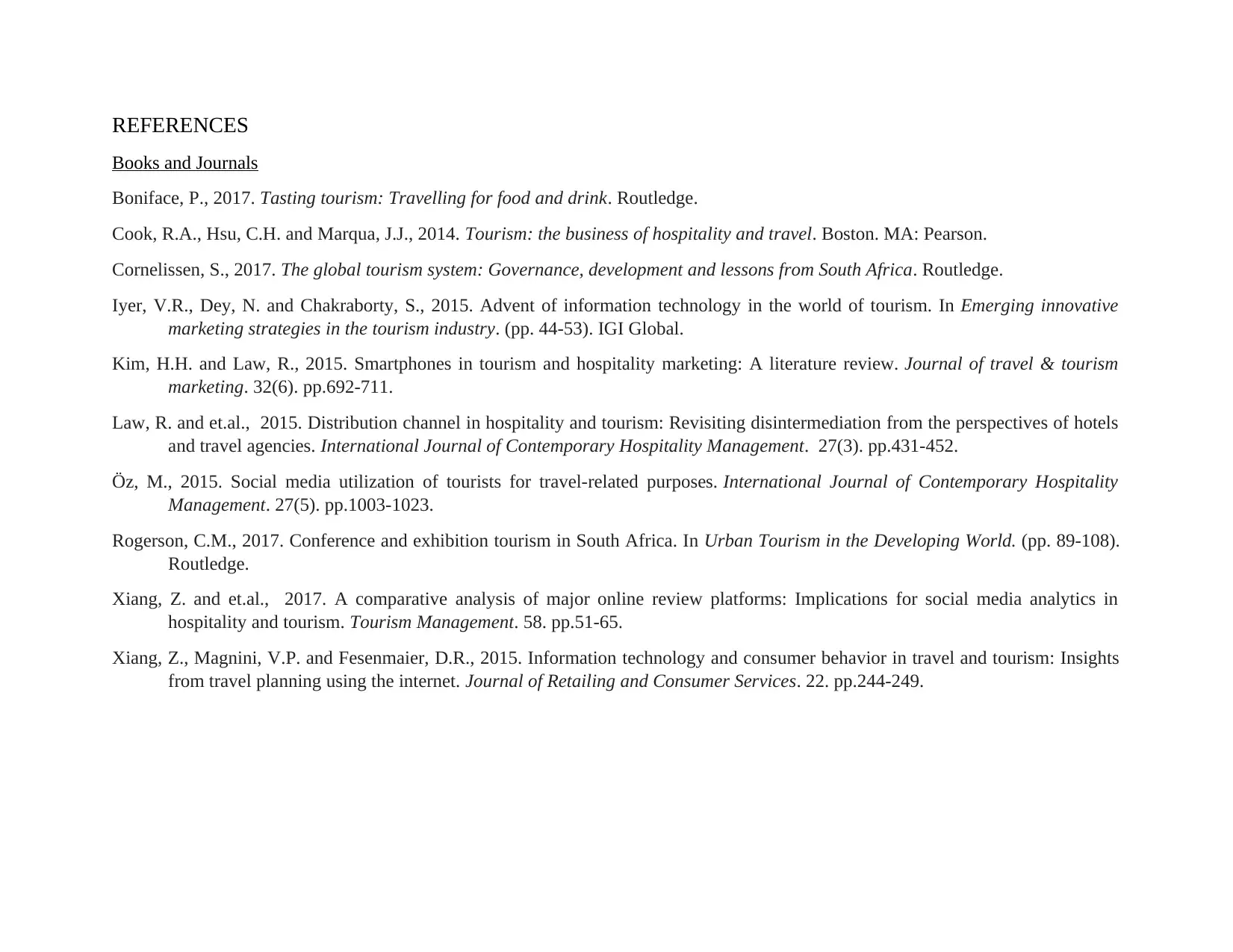
REFERENCES
Books and Journals
Boniface, P., 2017. Tasting tourism: Travelling for food and drink. Routledge.
Cook, R.A., Hsu, C.H. and Marqua, J.J., 2014. Tourism: the business of hospitality and travel. Boston. MA: Pearson.
Cornelissen, S., 2017. The global tourism system: Governance, development and lessons from South Africa. Routledge.
Iyer, V.R., Dey, N. and Chakraborty, S., 2015. Advent of information technology in the world of tourism. In Emerging innovative
marketing strategies in the tourism industry. (pp. 44-53). IGI Global.
Kim, H.H. and Law, R., 2015. Smartphones in tourism and hospitality marketing: A literature review. Journal of travel & tourism
marketing. 32(6). pp.692-711.
Law, R. and et.al., 2015. Distribution channel in hospitality and tourism: Revisiting disintermediation from the perspectives of hotels
and travel agencies. International Journal of Contemporary Hospitality Management. 27(3). pp.431-452.
Öz, M., 2015. Social media utilization of tourists for travel-related purposes. International Journal of Contemporary Hospitality
Management. 27(5). pp.1003-1023.
Rogerson, C.M., 2017. Conference and exhibition tourism in South Africa. In Urban Tourism in the Developing World. (pp. 89-108).
Routledge.
Xiang, Z. and et.al., 2017. A comparative analysis of major online review platforms: Implications for social media analytics in
hospitality and tourism. Tourism Management. 58. pp.51-65.
Xiang, Z., Magnini, V.P. and Fesenmaier, D.R., 2015. Information technology and consumer behavior in travel and tourism: Insights
from travel planning using the internet. Journal of Retailing and Consumer Services. 22. pp.244-249.
Books and Journals
Boniface, P., 2017. Tasting tourism: Travelling for food and drink. Routledge.
Cook, R.A., Hsu, C.H. and Marqua, J.J., 2014. Tourism: the business of hospitality and travel. Boston. MA: Pearson.
Cornelissen, S., 2017. The global tourism system: Governance, development and lessons from South Africa. Routledge.
Iyer, V.R., Dey, N. and Chakraborty, S., 2015. Advent of information technology in the world of tourism. In Emerging innovative
marketing strategies in the tourism industry. (pp. 44-53). IGI Global.
Kim, H.H. and Law, R., 2015. Smartphones in tourism and hospitality marketing: A literature review. Journal of travel & tourism
marketing. 32(6). pp.692-711.
Law, R. and et.al., 2015. Distribution channel in hospitality and tourism: Revisiting disintermediation from the perspectives of hotels
and travel agencies. International Journal of Contemporary Hospitality Management. 27(3). pp.431-452.
Öz, M., 2015. Social media utilization of tourists for travel-related purposes. International Journal of Contemporary Hospitality
Management. 27(5). pp.1003-1023.
Rogerson, C.M., 2017. Conference and exhibition tourism in South Africa. In Urban Tourism in the Developing World. (pp. 89-108).
Routledge.
Xiang, Z. and et.al., 2017. A comparative analysis of major online review platforms: Implications for social media analytics in
hospitality and tourism. Tourism Management. 58. pp.51-65.
Xiang, Z., Magnini, V.P. and Fesenmaier, D.R., 2015. Information technology and consumer behavior in travel and tourism: Insights
from travel planning using the internet. Journal of Retailing and Consumer Services. 22. pp.244-249.
1 out of 10
Related Documents
Your All-in-One AI-Powered Toolkit for Academic Success.
+13062052269
info@desklib.com
Available 24*7 on WhatsApp / Email
![[object Object]](/_next/static/media/star-bottom.7253800d.svg)
Unlock your academic potential
Copyright © 2020–2026 A2Z Services. All Rights Reserved. Developed and managed by ZUCOL.





